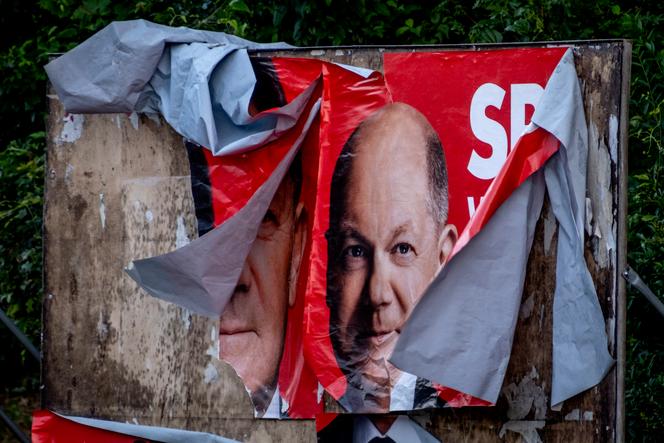
The suspense was quickly turned on its head. When asked about the possibility of early parliamentary elections following the disastrous results obtained by the parties of Olaf Scholz’s coalition in the European elections on Sunday, June 9, the German government’s spokesperson said that there was no question of it. “The date for the next elections has been set for the fall of 2025, and we plan to stick to it,” declared Steffen Hebestreit on Monday, June 10, asserting that “at no time, not even for a second, was it envisaged to organize new elections in Germany.”
So, unlike the French, Germans won’t be going back to the polls in the next few weeks. Yet this is what several conservative opposition leaders – as well as a number of editorialists – called for as soon as the first estimates giving the CDU-CSU a wide lead (30%, + 1.1 points compared with 2019), ahead of the far-right AfD party (15.9%, + 4.9) and the three components of the “tricolor light” coalition in power in Berlin: Scholz’s Social Democratic Party (SPD, 13.9%, -1.9), the Greens (11.9%, -8.6) and the Liberal Democrats of the FDP (5.2%, -0.2).
“The same thing must happen as in France, where Macron responded to those calling for new elections,” said Markus Söder, the leader of the conservative Bavarian CSU party, on Monday. “Germany also needs a fresh start. The coalition no longer has the confidence of the population. So we need new elections as soon as possible,” he added, calling on the chancellor to “have the same courage as Gerhard Schröder.” In 2005, after the SPD’s regional disaster in North Rhine-Westphalia, the then chancellor sought the confidence of the Bundestag, which refused him, leading the president, Horst Köhler, to dissolve it, triggering an early general election.
Scholz decided not to take such a risk. On Monday, the leaders of the three parties in his coalition met separately to draw lessons from the vote. Kevin Kühnert, the head of the SPD, which lost half its electorate between the 2021 parliamentary elections and Sunday’s European elections, said: “People want us to be more combative.” In concrete terms, this means that “an austerity budget at the expense of social cohesion will not be possible with social democracy in power,” he added.
The Greens, stunned
The message is directly addressed to the FDP and its president, Christian Lindner, the federal finance minister. On Monday, Lindner reiterated that “the coalition parties are committed to not raising taxes and to respecting the debt brake,” the constitutional measure that restricts the public deficit to 0.35% of gross domestic product. With the FDP in danger of failing to reach the 5% needed to be represented in the Bundestag in 2025, Lindner is more than ever the intransigent guardian of budgetary orthodoxy.
You have 46.27% of this article left to read. The rest is for subscribers only.